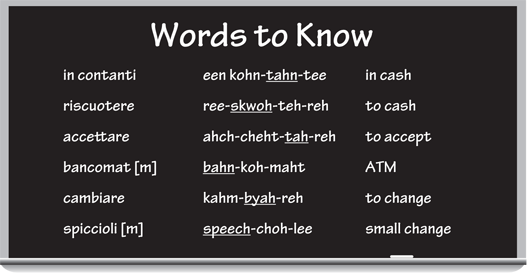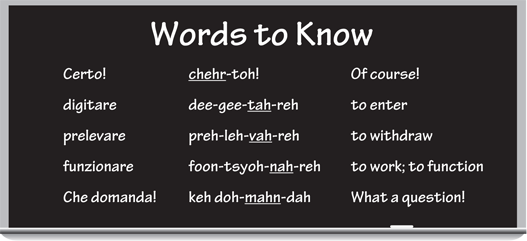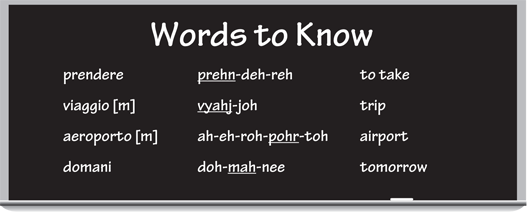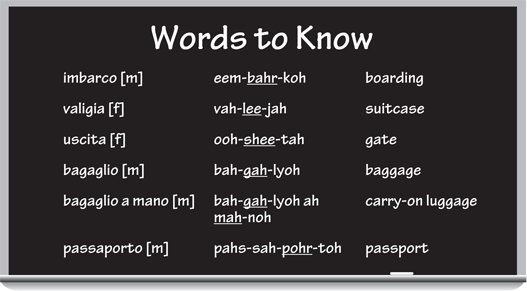Italian All-in-One For Dummies (79 page)
Read Italian All-in-One For Dummies Online
Authors: Consumer Dummies

Ms. Campbell:
Grazie mille!
grah
-tsyeh
meel
-leh!
Thanks a million!
Â
Nowadays, changing money is not the most efficient way to get the local currency. In Italy, as in most Western countries, you can find a
bancomat
almost anywhere. Also, depending on where you shop and eat, you can pay directly with a
carta di credito
(
kahr
-tah dee
kreh
-dee-toh) (
credit card
). The following phrases can help you find the cash you need (or at least the cash machine):
Dov'è il bancomat più vicino?
(doh-
veh
eel
bahn
-koh-maht pyooh vee-
chee-
noh?) (
Where is the nearest ATM?
)
Posso pagare con la carta di credito?
(
pohs
-soh pah-
gah
-reh kohn lah
kahr
-tah dee
kreh
-dee-toh?) (
May I pay with my credit card?
)
Mi scusi, potrebbe cambiarmi una banconota da 100 euro?
(mee
skooh
-zee, poh-
trehb
-beh kahm-
byahr
-mee
ooh
-nah bahn-koh-
noh
-tah da
chehn
-toh
eh
-ooh-roh?) (
Excuse me, would you be able to change a 100 euro bill?
)
Mi dispiace, non accettiamo carte di credito.
(mee dee-
spyah
-cheh, nohn ahch-cheht-
tyah
-moh
kahr
-teh dee
kreh
-dee-toh.) (
I'm sorry, we don't accept credit cards.
)
Mi dispiace, non ho spiccioli.
(mee dees-
pyah
-cheh, nohn oh
speech
-choh-lee.) (
I'm sorry, I don't have any small change.
)

Using Credit Cards
In Canada and the United States you can take care of almost all your financial needs without ever handling cash. You can pay for almost everything with your debit or credit card. You can even use your credit card to get cash at ATMs and in some banks. This is the same in Italy, although cash is still the customary form of payment in many parts of Italy.
Talkin' the Talk
Ms. Johnson wants to withdraw some euros with her credit card but discovers that the ATM is out of order. She enters the bank and asks the cashier about the problem.
Ms. Johnson:
Scusi, il bancomat non funziona.
skooh
-zee eel,
bahn
-koh-maht nohn foohn-
tsyoh
-nah.
Excuse me, the ATM isn't working.
Cashier:
Lo so, signora, mi dispiace!
loh soh, see-
nyoh
-rah, mee dees-
pyah
-cheh!
I know, madam, I'm sorry!
Ms. Johnson:
Ma ho bisogno di contanti.
mah oh bee-
zoh
-nyoh dee kohn-
tahn
-tee.
But I need cash.
Cashier:
Può prelevarli qui alla cassa.
pwoh preh-leh-
vahr
-lee kwee
ahl
-lah
kahs
-sah.
You can withdraw it here at the counter.
Ms. Johnson:
D'accordo, grazie.
dak
-kohr-doh, grah-
tsyeh.
Okay, thanks.
Â
Normally, things go easily and you don't have any problems using credit cards. But you may be asked to show your identification for security purposes. The following phrases can help you be prepared for this situation:
Potrei vedere un documento per favore?
(poh-
trey
veh-
deh
-reh oohn doh-kooh-
mehn
-toh pehr fah-
voh
-reh?) (
May I please see your identification?
)
Potrebbe darmi il suo passaporto, per favore?
(poh-
trehb
-beh
dahr
-mee eel
sooh
-oh pahs-sah-
pohr
-toh, pehr fah-
voh
-reh?) (
Would you please give me your passport?
)
Il suo indirizzo?
(eel
sooh
-oh een-dee-
reet
-tsoh?) (
What is your address?
)
You may have to wait to exchange money. The following sentence says all you need to know about this rather formal verb:
attendere
(aht-
tehn
-deh-reh) (
to wait
).
Attenda, per favore.
(aht-
tehn
-dah, pehr fah-
vo
h-reh.) (
Please wait.
)

Looking at Various Currencies
Along with many other European countries, the Italian monetary unit is the
euro
(
eh-
ooh-roh). There are 1-euro coins and 2-euro coins as well as larger bills (5, 10, 20, 50, 100, and so on). The plural form is
euro
(
eh-
ooh-roh), and the abbreviation is â¬. (That's right, the singular and the plural forms are exactly the same). Smaller denominations are in
centesimi
(chehn-
teh-
zee-mee) (
cents
) and are coins. (You can check out
Chapter 2
in Book I for numbers.)
Talkin' the Talk
 Patrizia is planning her vacation to Croatia. She is planning on taking the
Patrizia is planning her vacation to Croatia. She is planning on taking the
aliscafo
(ah-leeh-
skah
-foh) (
high-speed ferry
) from Ancona tomorrow. She talks to her friend, Milena, about exchanging her money. (Track 24)
Patrizia:
Sai qual è il cambio euro in kuna croata?
sayh kwah-
leh
eel
kahm
-byoh
eh-
ooh-roh een
kooh
-nah kroh-
ah
-tah?
Do you know the exchange rate for euros to Croatian kuna?
Milena:
Non ne ho idea!
nohn neh oh ee-
deh
-ah!
I have no idea!
Patrizia:
Domani parto per Zara per un mese.
doh-
mah
-nee
pahr
-toh pehr
dsah
-rah perh oohn
meh
-zeh.
Tomorrow I'm leaving for Zara for a month.
Milena:
E non hai ancora cambiato!
eh nohn ahy ahn-
koh
-rah kahm-
byah
-toh!
And you haven't changed your money yet!
Patrizia:
Posso farlo al porto.
pohs
-soh
fahr
-loh ahl
pohr
-toh.
I can do it at the port.
Milena:
Ma no, è più caro!
mah
noh
, eh pyooh
kah
-roh!
No, that's more expensive!
Patrizia:
Mi accompagni in banca?
mee ahk-kohm-
pah
-nyee een
bahn
-kah?
Will you come with me to the bank?
Â
 The
The
euro
is legal tender in 17 of the 27 countries that belong to the European Union (EU). So, if you travel among EU countries after you have euros in your possession, you don't have to change money in every country you visit. Since 2002, the Italian
lira
has disappeared, and the euro is the only valid currency in Italy.
Table 5-1
shows the currencies of various countries.


Chapter 6
Getting Around: Planes, Trains, Taxis, and Buses
In This Chapter
 Traveling by airplane
Traveling by airplane
 Declaring your goods to customs
Declaring your goods to customs
 Getting a rental car
Getting a rental car
 Using public transportation
Using public transportation
 Talking about departures and delays
Talking about departures and delays
W
hether you're visiting Italy or you just need to explain to an Italian-speaking friend how to get across town, transportation vocabulary comes in handy. This chapter helps you make your way through the airport and also helps you secure transportation to get where you're going once you're on the ground, whether by taxi, bus, car, or train. Further, you discover what to do at customs, how to find missing luggage, and how to rent a car.
Andiamo!
(ahn-
dyah
-moh!) (
Let's go!
)
Getting through the Airport
You're lucky, because it's very likely that you can get by with English when you're at an Italian airport. Both Italian and English are usually spoken there. But, you just may be in a situation where the person next to you in an airport knows only Italian. Just in case, you should know some useful navigational phrases. Besides, you'll probably want a chance to practice the language in which you'll be immersed once you step outside the airport.
Checking in
Italians refer to the moment you finally get rid of your luggage as
accettazione
(ahch-cheht-tah-
tsyoh
-neh) (
check-in
). Sometimes they use the English
check-in
instead of
accettazione.
You pick up your boarding pass at the check-in counter, where speaking is usually inevitable. The following dialogue contains some of the sentences people commonly exchange.
Talkin' the Talk
Ms. Adami is checking in. She shows her ticket and passport to the agent and leaves her suitcases at the counter.
Agent:
Il suo biglietto, per favore.
eel
sooh
-oh bee-
lyeht
-toh, pehr fah-
voh
-reh.
Your ticket, please.
Sig.ra Adami:
Ecco.
ehk
-koh.
Here it is.
Agent:
Passaporto?
pahs-sah-
pohr
-toh?
Passport?
Sig.ra Adami:
Prego.
preh
-goh.
Here you are.
Agent:
Quanti bagagli ha?
kwahn
-tee bah-
gah
-lyee ah?
How many suitcases do you have?
Sig.ra Adami:
Due valigie e un bagaglio a mano.
dooh
-eh vah-
lee
-jeh eh oohn bah-
gah
-lyoh ah
mah
-noh.
Two suitcases and one piece of carry-on luggage.
Agent:
Qual è la sua destinazione?
qwahl
eh
lah
sooh
-ah deh-stee-nah-
tsyoh-
neh?
What is your destination?
Sig.ra Adami:
New York.
nooh yohrk.
New York.
Agent:
Ha fatto Lei le proprie valige?
ah
faht
-toh ley leh
proh
-pryeh vah-
lee
-jeh?
Did you pack your own bags?
Sig.ra Adami:
Sì.
see.
Yes.
Agent:
Le ha sempre avute sotto mano da quando le ha chiuse?
leh ah
sehm
-preh ah-
vooh
-teh
soht
-toh
mah
-noh dah
qwahn
-doh leh ah
kyoo
h-zeh?
Have they been with you the whole time since you closed them?
Sig. ra Adami:
Sì; posso avere un posto vicino al finestrino, per favore?
see;
pohs
-soh ah-
veh
-reh oohn
pohs
-toh vee-
chee
-noh ahl fee-neh-
stree
-noh, pehr fah-
voh
-reh?
Yes (I have); may I please have a window seat?
Agent:
Un attimo, ora controllo . . . si, glielo do. Ecco la sua carta d'imbarco.
oohn
aht
-tee-moh,
oh
-rah kohn-
trohl
-loh . . . see,
lyeh
-lah doh.
ehk
-koh lah
sooh
-ah
kahr
-tah deem-
bahr
-koh.
One second, I'm going to check now . . . yes, I can. Here is your boarding pass.
L'imbarco è alle nove e quindici, uscita tre. Prosegua al controllo di sicurezza.
leem-
bahr
-koh eh
ahl
-leh
noh
-veh eh
kween
-dee-chee, ooh-
shee
-tah treh. proh-
seh-
gwah ahl kohn-
trohl
-loh dee see-koohr-
ehts
-tsah.
Boarding is at 9:15, gate 3. You can move on to security now.
Â

Dealing with excess baggage
Sometimes your suitcases are so heavy that the airline charges an extra fee to transport your luggage. The truth is that you really can't say much; you simply have to pay.
Questa valigia eccede il limite.
(
kweh
-stah vah-
lee
-jah ehch-
cheh
-deh eel
lee
-mee-teh.) (
This bag is over the weight limit.
)
Ha un eccesso di bagaglio.
(ah oohn ehch-
ches
-soh dee bah-
gah
-lyoh.) (
You have excess luggage.
)
Deve pagare un supplemento.
(
deh
-veh pah-
gah
-reh oohn soohp-pleh-
mehn
-toh.) (
You have to pay a surcharge.
)
Questo bagaglio a mano eccede le misure.
(
kweh
-stoh bah-
gah
-lyoh ah
mah
-noh ehch-
che
-deh
leh mee
-zooh
-reh.) (
This carry-on bag exceeds the size limit.
)
 Before you go to the airport, always find out the weight limit of your bags and how much an extra suitcase will cost. Then you can buy an extra suitcase if necessary and avoid having to throw out precious items at check-in.
Before you go to the airport, always find out the weight limit of your bags and how much an extra suitcase will cost. Then you can buy an extra suitcase if necessary and avoid having to throw out precious items at check-in.
Waiting to board the plane
Before boarding, you may encounter unforeseen situations, such as delays. If you do, you'll probably want to ask some questions. Read the following dialogue for an example of what you can say when you're dealing with a delay.
Talkin' the Talk
Mr. Campo is in the boarding area. He asks the agent whether his flight is on time. Always be prepared for cryptic answers.
Sig. Campo:
Il volo è in orario?
eel
voh
-loh eh een oh-
rah
-ryoh?
